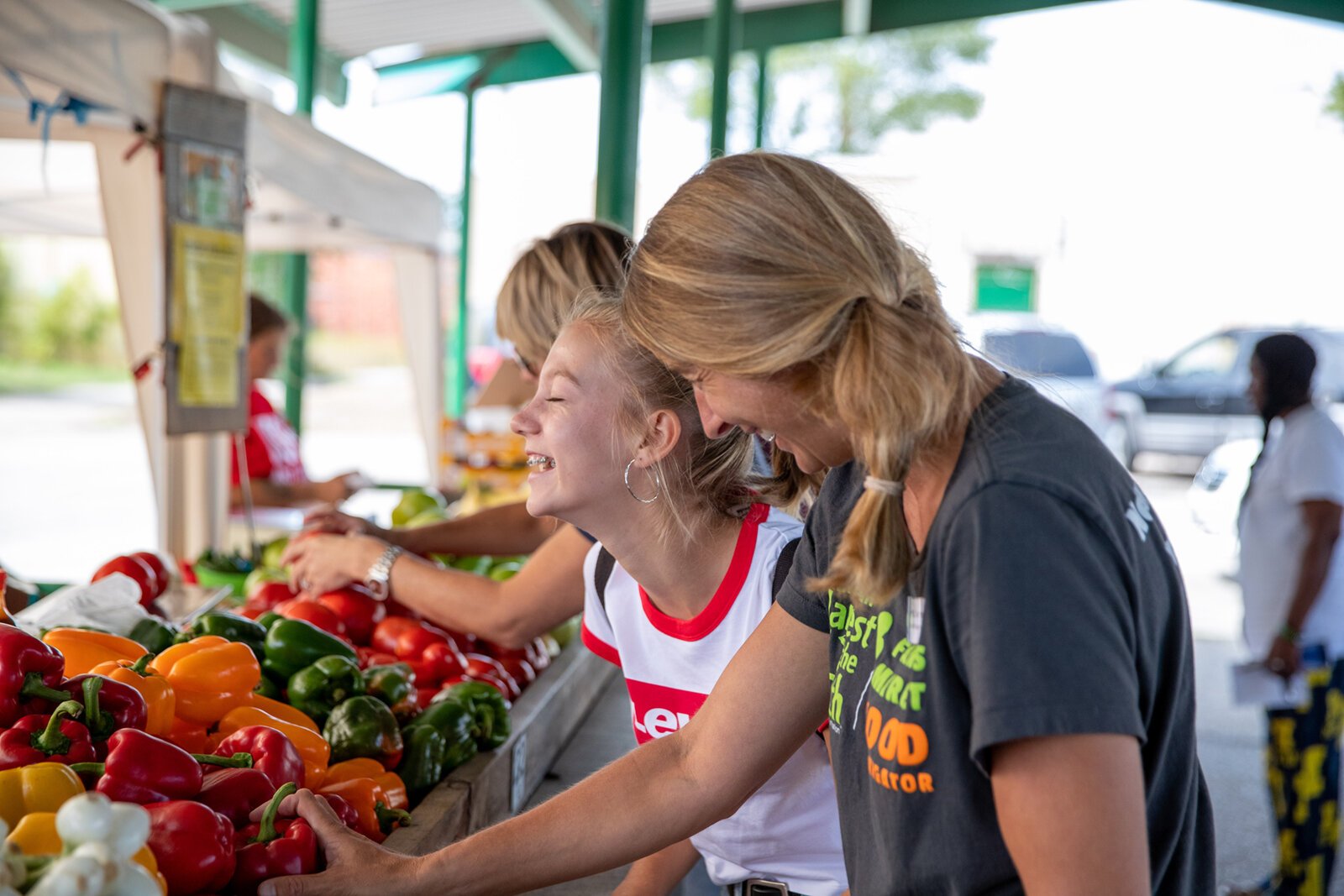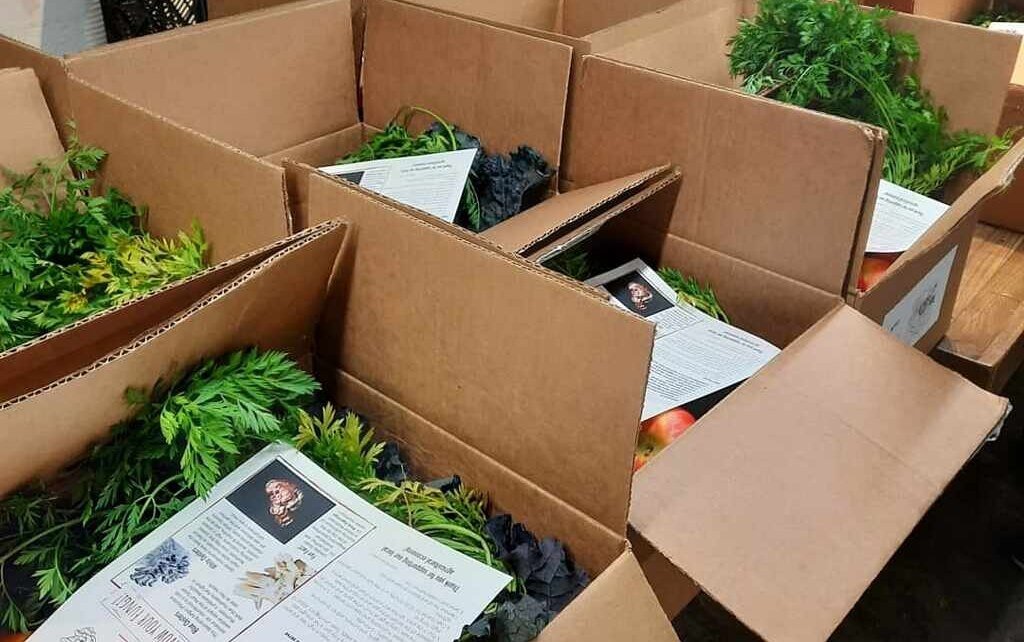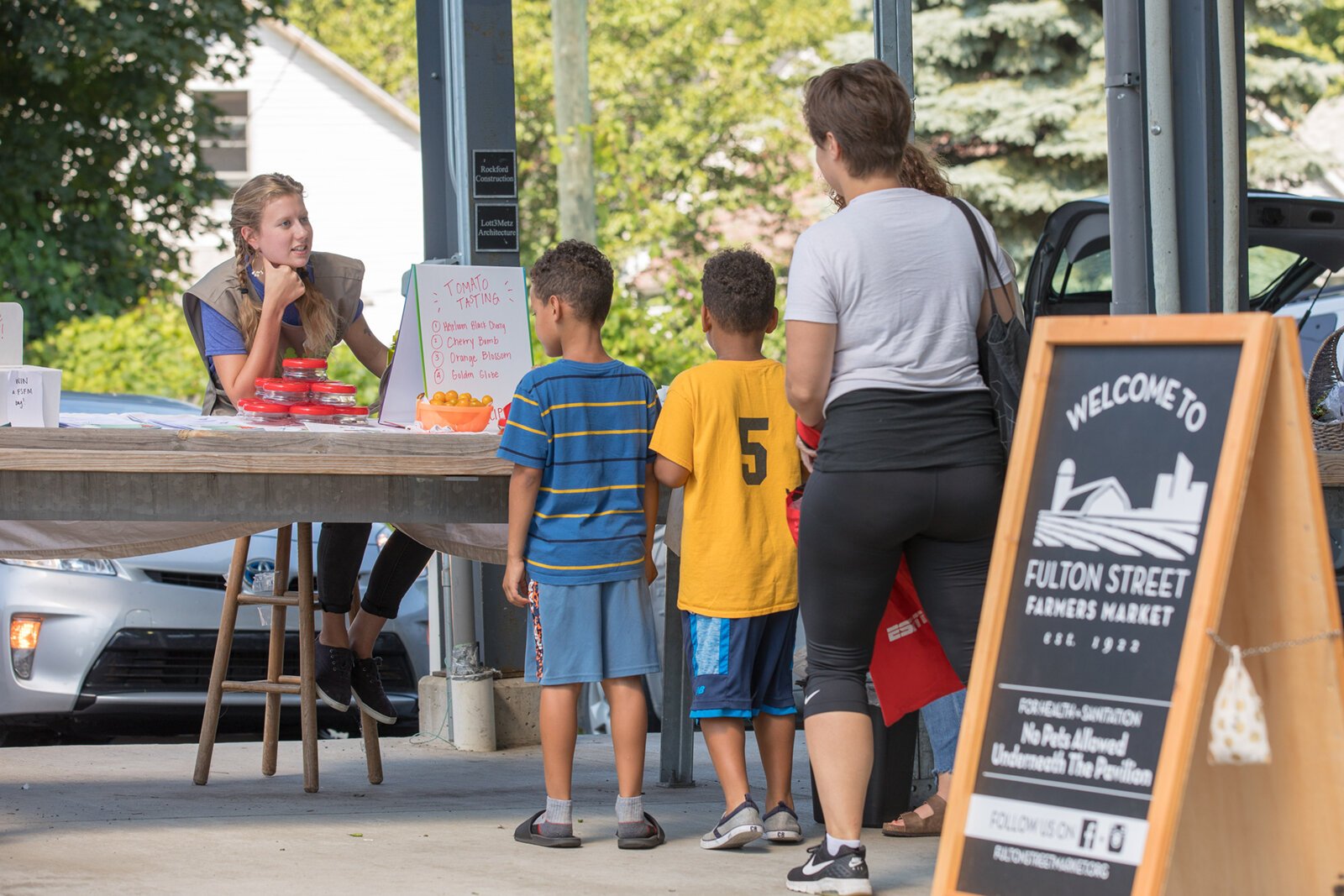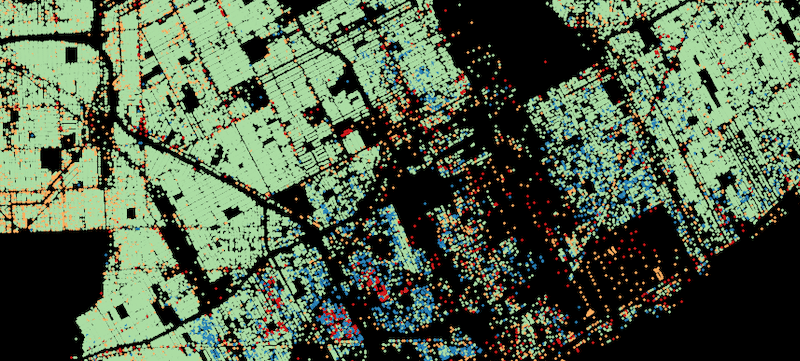Partner Partner Content Michigan Fitness Foundation connects families to farmers and fresh, locally grown food
Michigan Fitness Foundation has been working with Michigan farmers and farmers market managers to reduce barriers to accessing fresh, locally grown fruits and vegetables for families on tight budgets.

This article is part of Stories of Change, a series of inspirational articles of the people who deliver evidence-based programs and strategies that empower communities to eat healthy and move more. It is made possible with funding from Michigan Fitness Foundation.
Over the years, Michigan Fitness Foundation (MFF) has been developing and delivering programs to help all Michiganders eat healthy and move more. Most recently, MFF has been working with Michigan farmers and farmers market managers to reduce barriers to accessing fresh, locally grown fruits and vegetables for families on tight budgets.
MFF’s innovative Michigan Farm to Family: CSA (MF2FCSA) program addresses the gap between local farmers and consumers by partnering with local farms and community organizations to provide affordable access to nutritious, locally grown produce to residents in their communities. By creating a customized community supported agriculture (CSA) model, the MF2FCSA program makes it possible for families to join a local CSA, pay with SNAP, and strengthen their local food systems. The program is made possible through MFF’s grant from the National Institute of Food and Agriculture and Gus Schumacher Nutrition Incentive Program with support from Michigan CSA farmers, non-profit community organizations, and grant match funding partners.
“The Farm to Family: CSA program makes becoming a member of a community supported agriculture program or CSA to receive weekly boxes of fresh fruits and vegetables grown locally accessible and affordable,” says Jane Whitaker, MF2FCSA program manager. “For many families, it is cost prohibitive to join a CSA upfront. CSA partners in our program waive that requirement for people using SNAP and accept weekly payments instead. Our program also pays 75% of the price of the CSA share or farm box, which means participants that join our program can purchase a CSA box of delicious, locally grown fruits and vegetables for just $5 to $7 a week and our program pays the difference to the CSAs.”

MF2FCSA helps Michigan’s local farmers too.
“Now the farmers have a whole new market for the fruits and vegetables they grow,” Whitaker says. “Another important goal and benefit of our program is that we’re investing in the local farms and local food systems that supply our food in Michigan, which also provides commerce and employment.”
In addition to a new revenue stream, the farmers also develop deeper community relationships. The first year of the program had seven participating farms and organizations. In just two years the program has tripled to include 22 participating farms and organizations across the state.
To support consumption of the fresh fruits and vegetables people receive in their CSA farm box, and make the program stronger, nutrition education offered at the distribution sites is rooted in a customized version of MFF’s Farmers Market Food Navigator (FMFN) program.
The FMFN program is made possible through MFF Supplemental Nutrition Assistance Program Education (SNAP-Ed) funding. MFF is a State Implementing Agency of the Michigan Department of Health and Human Services for the education component of the Supplemental Nutrition Assistance Program. SNAP-Ed is an education program of the U.S. Department of Agriculture that teaches people eligible for SNAP how to live healthier lives. MFF offers grants to conduct SNAP-Ed programming throughout the state of Michigan.
Navigating the farmers market
MFF’s FMFN program embeds SNAP-Ed nutrition educators as Farmers Market Food Navigators (Food Navigators) at farmers markets to assist shoppers using food assistance programs. Food Navigators help shoppers understand how to use food assistance programs like SNAP, Double Up Food Bucks, WIC, Senior Project FRESH/Market FRESH coupons, Prescription for Health, etc., and how to stretch their food dollars. Using an experiential nutrition education approach, Food Navigators provide market tours; introduce shoppers to the farmers who grow their food; share strategies to help them select, store, and prepare fresh fruits and veggies; provide recipe tastings; and share recipes with people to make at home.
“We developed the Farmers Market Food Navigator program in collaboration with the Michigan Farmers Market Association,” says Teresa Zwemer, MFF interim director of resources and training. “Our program supports farmers market programming as part of our overall SNAP-Ed programming in Michigan. And our Food Navigators are there to ensure everyone using food assistance feels welcome at the market, gets the support they need, and has a positive experience that inspires them to add more nutritious fruits and vegetables to their plates.”
“We’re helping shoppers to maximize their food dollars and understand all the different programs,” Zwemer says. “Lots of people don’t know that Double Up Food Bucks is available in Michigan, or understand how the food assistance process works in farmers markets, especially when you’re doing multiple transactions with different vendors. It can be confusing and feel overwhelming. Our Food Navigators help reduce the confusion and stress that can arise for shoppers using food assistance.”

MFF took components from the FMFN program as the basis for nutrition education programming to meet the needs at MF2FCSA distribution sites. While they didn’t need to give market tours or explain how to use different types of food assistance, they carried over the experiential nutrition education components, such as nutrition education information, recipe tastings, take-home recipes, and tips about how to select, prepare, and store the produce participants receive in their farm boxes each week.
On a typical CSA pickup day, MFF SNAP-Ed nutrition educators work as Food Navigators in conjunction with the local CSAs to set up a space where they serve the MF2FCSA participants picking up their farm boxes. Kelly Voelker, a nutrition educator with the Washtenaw Intermediate School District Healthy Habits Start Now program, says this is her favorite part of the job.
“Our MF2FCSA Food Navigator program is at Argus Farm Stop in Ann Arbor. It is a little bit different than other locations because it’s not just one farm but a store. Different farmers are contributing to the box each week,” says Voelker. “People get such fresh produce — it’s traveled a few miles at most — so it tastes great and more nutritious. They really get more bang for their buck in this program, and they are supporting the community as well.”
“Last year, we saw the same people every week. I got to know them by name. Their kids would come in with them too. The kids would try this stuff and tell their mom how they liked it. It was really fun,” Voelker says. “People really weren’t familiar with some of the fruits and vegetables that I thought were pretty common. They really didn’t know what to do with them. It was actually very helpful to have someone like me there that wasn’t trying to sell them anything, just offering a chance to talk about the food – what you like and what you can do with the stuff in your box.”
An unexpected benefit of having Voelker at the location was that other people became curious about the MF2FCSA program during the CSA farm box pickups, and learned they were qualified to join because they used SNAP too.
“I just opened up my farm box of fresh produce and showed people what was in it,” she says. “Being there was a win-win for everyone.”
The customized FMFN program is has proven to be a valuable asset to the MF2FCSA program, and more farms and organizations will be hosting SNAP-Ed nutrition educators as MF2FCSA Food Navigators at their distribution pickup sites this year.
“Being able to have a Food Navigator provide the information and resources people need to store and prepare the food once they bring it home ensures success for the growers and the families that are purchasing fresh food,” says Whitacre. “By reducing the struggle to create healthy meals affordably, people have an opportunity to live healthier lives.”
By looking at their programs and customizing them to fit community needs, MFF is breaking down some of the barriers to healthy eating that lower-income families face.
“We have created programs to support people using food assistance, and at the same time are supportive of the farmers, farmers markets, vendors, market managers, and organizations who are running the programs,” Zwemer says. “We want our programs to be valuable community assets. It is important for us to look at how we can influence behavior change as well as the bigger-picture policy, systems, and environmental change work that can make lasting change where people live, work, and play. We want to inspire people to make the healthy choice because it is the easy choice.”




